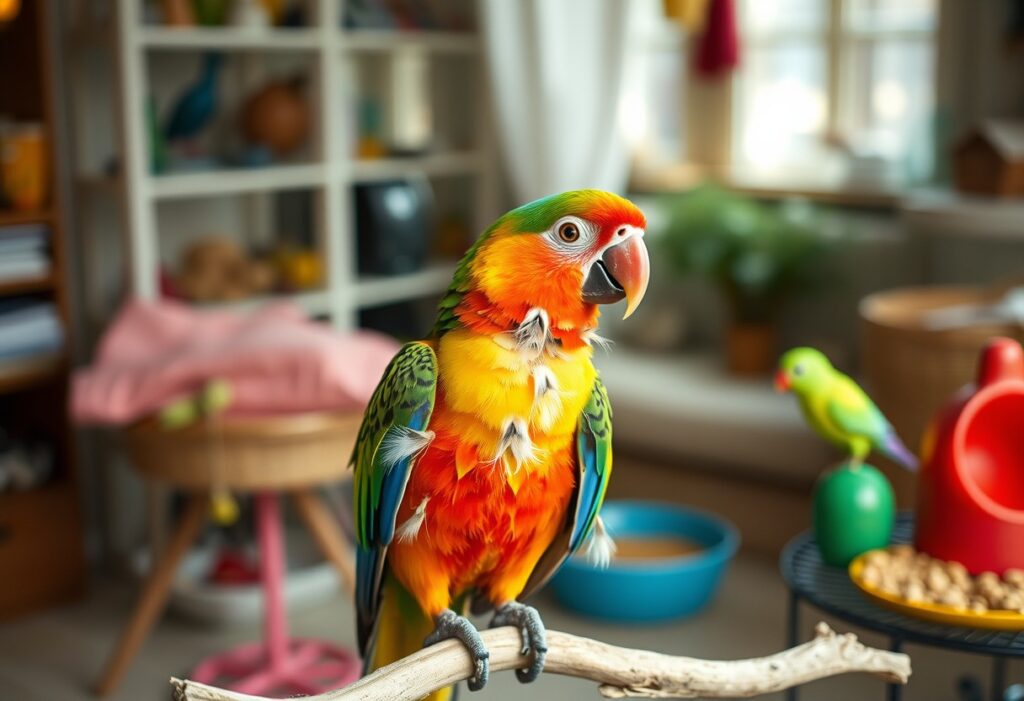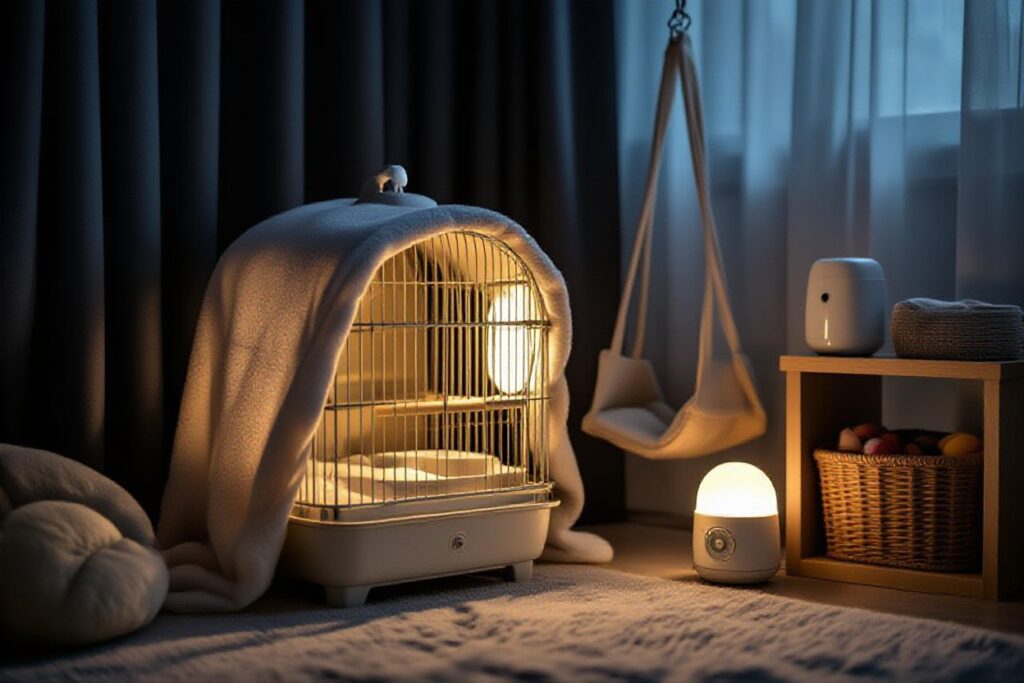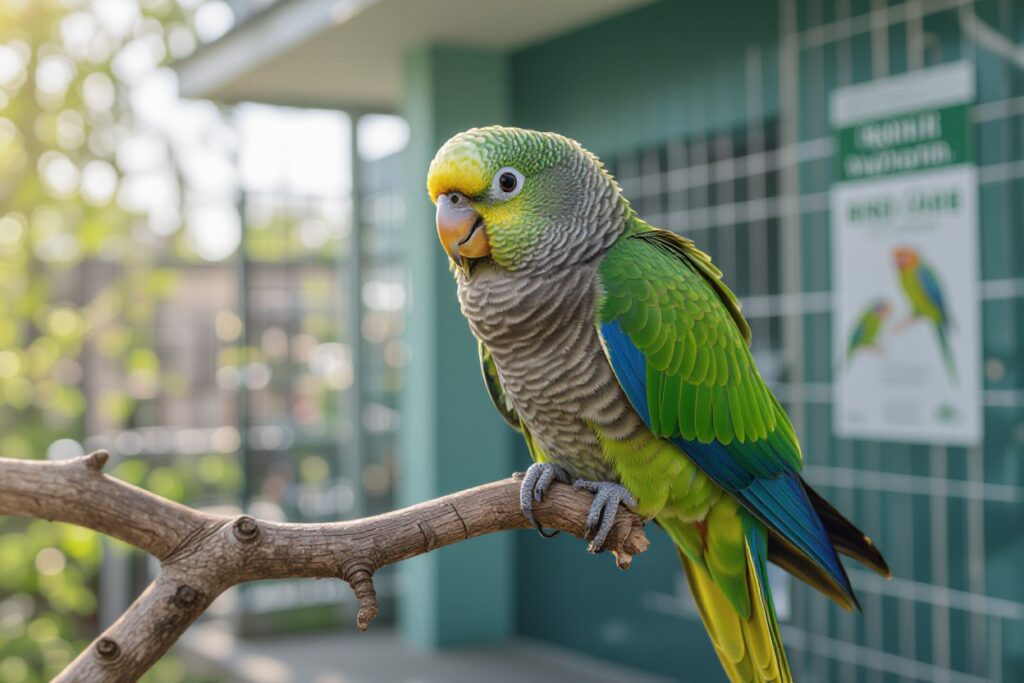Tranquility is important for the well-being of your feathered friends. A calm environment reduces stress among birds, ultimately leading to improved health and behavior. When you create a serene atmosphere, you help lower their anxiety levels, which can prevent issues like feather plucking or excessive vocalization. Additionally, a peaceful setting allows your birds to thrive and fosters a stronger bond with you. Understanding the importance of a tranquil space enables you to provide the best care possible for your avian companions.
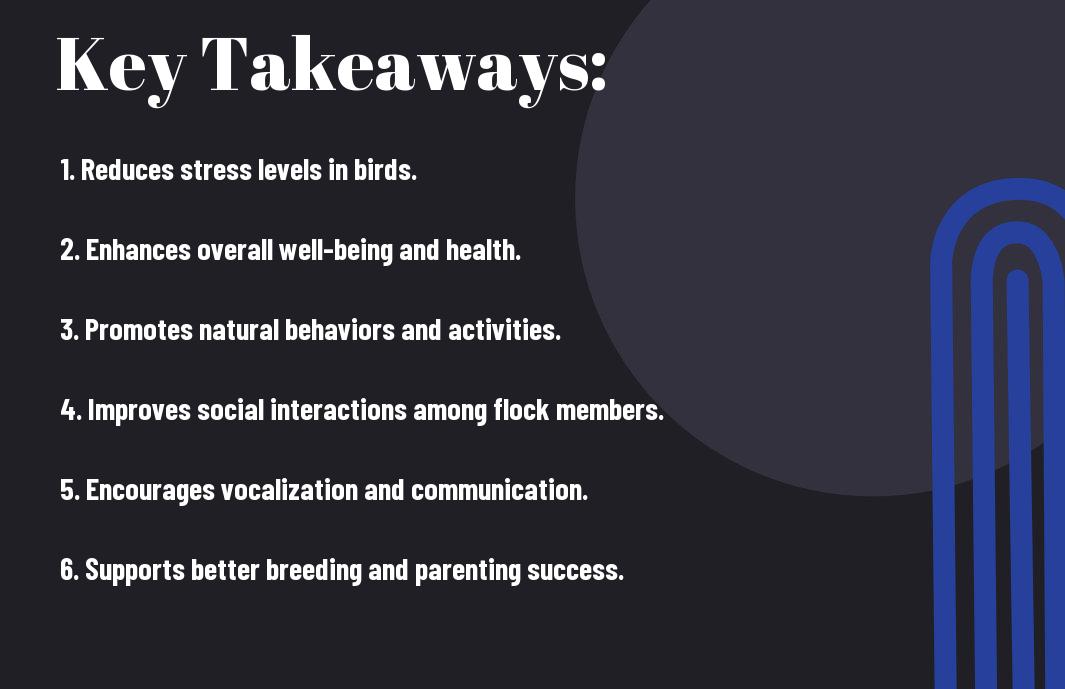
Understanding Bird Behavior
While it might seem that birds are simple creatures, their behavior is deeply intertwined with their natural instincts and the environments in which they thrive. Taking the time to understand avian behavior can significantly enhance your ability to create a calm environment for your feathered friends, ensuring they feel secure and happy.
Natural Instincts and Habitats
To truly appreciate bird behavior, you must consider the natural instincts that guide them. Birds are instinctively wired to respond to their surroundings and exhibit behaviors that ensure their survival, such as seeking shelter, foraging for food, and engaging in social interactions. These instincts are often reflective of the habitats in which they evolved; for example, some birds prefer dense foliage where they can hide from predators, while others thrive in open spaces where they can easily spot danger.
Creating an environment that caters to these instincts can greatly reduce stress in birds. When you mimic their natural habitats through carefully planned enclosure design or by placing their perches and toys strategically, you help them feel more at home. A calm environment supports their instinctual behaviors, allowing them to explore and express themselves naturally.
The Impact of Stress
One of the most significant factors affecting bird behavior is stress. Birds can experience stress from various sources, including loud noises, unpredictable movements, and even other pets in the household. This stress can lead to a multitude of behavioral issues such as feather plucking, aggression, and withdrawal, which can be detrimental to their well-being.
Stress can manifest physically as well as behaviorally. If you notice your bird is more irritable or withdrawn, it may be time to reevaluate their environment. Ensuring a calm and safe space will help reduce stress levels, allowing your birds to thrive and engage in their natural behaviors more effectively.
Social Interactions
Impact on bird behavior extends to their social interactions. Birds are inherently social creatures, and their well-being is significantly influenced by their interactions with other birds or even their human companions. A calm environment facilitates positive socialization, thereby allowing your birds to engage and bond without feeling threatened.
Social dynamics can change rapidly in a chaotic environment, leading to competition and stress. By providing safe spaces and opportunities for social interactions, you can enhance their lives and create a more pleasant atmosphere. When birds feel secure in their social setting, they are more likely to exhibit playful and affectionate behaviors that are crucial for their mental health.
Social interactions are vital for bird development, and understanding their need for companionship is key to maintaining a harmonious environment. When you foster these relationships, it enriches your birds’ lives and allows for a more fulfilling avian experience.
The Importance of a Calm Environment
Assuming you are a dedicated bird owner or enthusiast, you understand the significance of creating a peaceful environment for your feathered friends. A calm environment is imperative not only for the physical health of your birds but also for their overall psychological well-being. When birds are kept in surroundings that are stress-free and quiet, they are less likely to exhibit signs of anxiety or agitation, which can lead to serious health issues such as feather plucking, aggression, and even illness. By providing a tranquil habitat, you can help your birds thrive emotionally and physically.
Psychological Well-Being
With a serene environment, you enhance your birds’ psychological well-being. Birds, much like humans, are sensitive to their surroundings. Sudden loud noises, chaotic movements, or invasive interactions can dramatically increase their stress levels. Over time, this can lead to negative behavioral changes, including decreased activity, vocalization, and even health disorders. By maintaining a peaceful atmosphere, you enable your birds to feel secure and at ease, contributing to their happiness and overall longevity.
Enhanced Communication
The communication abilities of birds are often overlooked in discussions about their needs. Birds rely heavily on vocal cues and body language to express their feelings and intentions. In a calm environment, they are more likely to communicate openly and effectively with you and other birds. When the atmosphere is relaxed, you may find that your birds are more vocal and interactive, helping to strengthen the bond between you and your avian companions.
To facilitate effective communication among birds, it’s important to minimize environmental stressors. This includes reducing loud noises, abrupt movements, and overcrowding in their habitat. A tranquil environment encourages your birds to chirp, sing, and display their natural behaviors, allowing you to forge deeper connections and understand their needs better.
Improved Reproductive Success
Enhanced reproductive success is yet another significant reason to prioritize a calm environment for your birds. Stress can negatively impact the reproductive cycle of many bird species, leading to issues such as infertility or reduced egg production. When birds are kept in a stress-free setting, they are more inclined to engage in mating behaviors, lay eggs, and successfully raise their young.
Understanding the connection between a tranquil environment and improved reproductive outcomes is crucial. Providing a serene space allows your birds to focus their energy on natural behaviors rather than coping mechanisms often associated with stress. Consequently, they are more likely to produce healthier offspring, which adds to the ecological balance and enriches your experience as a bird owner.
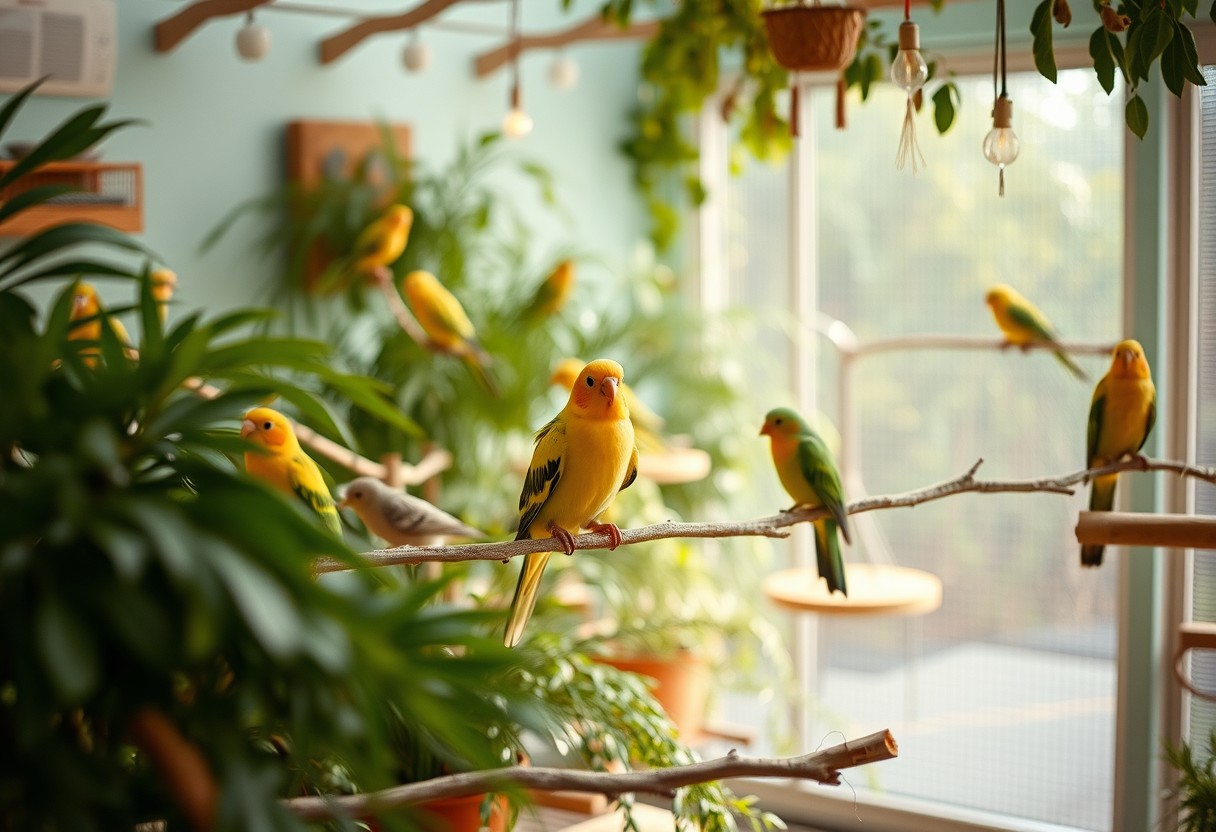
Creating a Calm Environment
After understanding the importance of a calm environment for your birds, the next step is to implement strategies that will foster serenity and comfort. Creating a tranquil atmosphere not only benefits your feathered friends but also enhances your own enjoyment of their company. By thoughtfully designing your space, reducing noise, and incorporating natural elements, you can ensure that your birds thrive in a peaceful setting.
Ideal Space Design
On the foundation of a calm environment lies the **ideal space design**. You should aim to create areas that are free from clutter and distractions to provide your birds with a sense of security. **Strategically placing perches**, plants, and toys can create a harmonious space for your pets to explore and relax. Ensure that their living area is spacious enough, allowing them to move freely without feeling trapped or stressed. The colors of the environment can also affect their mood; consider using soft, natural hues that promote tranquility.
On top of that, it’s crucial to place your bird’s cage away from any strong **direct sunlight** or **drafts**, as these can lead to discomfort. **Layering different levels** in their setup, such as platforms and hiding spots, can also make your birds feel secure and help reduce stress levels, encouraging them to engage in calming behaviors.
Noise Reduction Techniques
Any effective plan for creating a calm environment should prioritize **noise reduction techniques**. Birds are naturally sensitive to loud sounds, so controlling the noise levels around them is important. You can achieve this by minimizing exposure to **loud appliances** and keeping their area away from busy household spaces. Utilizing curtains or blinds can help dampen outside noises, creating a more peaceful setting for your birds.
Any additional measures, such as employing **soft background music** or white noise machines, can also mask sudden sounds that might startle your pets. By maintaining a quiet atmosphere, you make it easier for your birds to relax and feel safe within their surroundings.
This is an important consideration, as the **presence of constant loud noises** can result in chronic stress for your birds, affecting their overall health and behavior. Remember to be mindful of any loud visitors or activities that could disrupt their peace and quickly adapt your strategies for noise reduction when more guests are present.
Natural Elements and Enrichment
For creating an even more calming environment, incorporating **natural elements and enrichment** is paramount. Birds are instinctively drawn to their natural habitats, so introducing plant life, branches, and safe, non-toxic flowers can help replicate this experience. By providing tactile and visual stimulation, you promote their natural behaviors and overall wellbeing, reducing stress and anxiety.
For additional enrichment, consider including **foraging opportunities** that encourage problem-solving and keep their minds active. This approach not only stimulates their mental faculties but also mimics the search for food they would experience in the wild, contributing to a calming, fulfilling environment.
Noise reduction isn’t just about controlling volume; it also involves recognizing how **nature sounds**, like running water or gentle wind chimes, can positively impact your birds. These sounds can have a soothing effect and create an ambiance that feels secure and comfortable, fostering a climate where your birds can truly thrive.
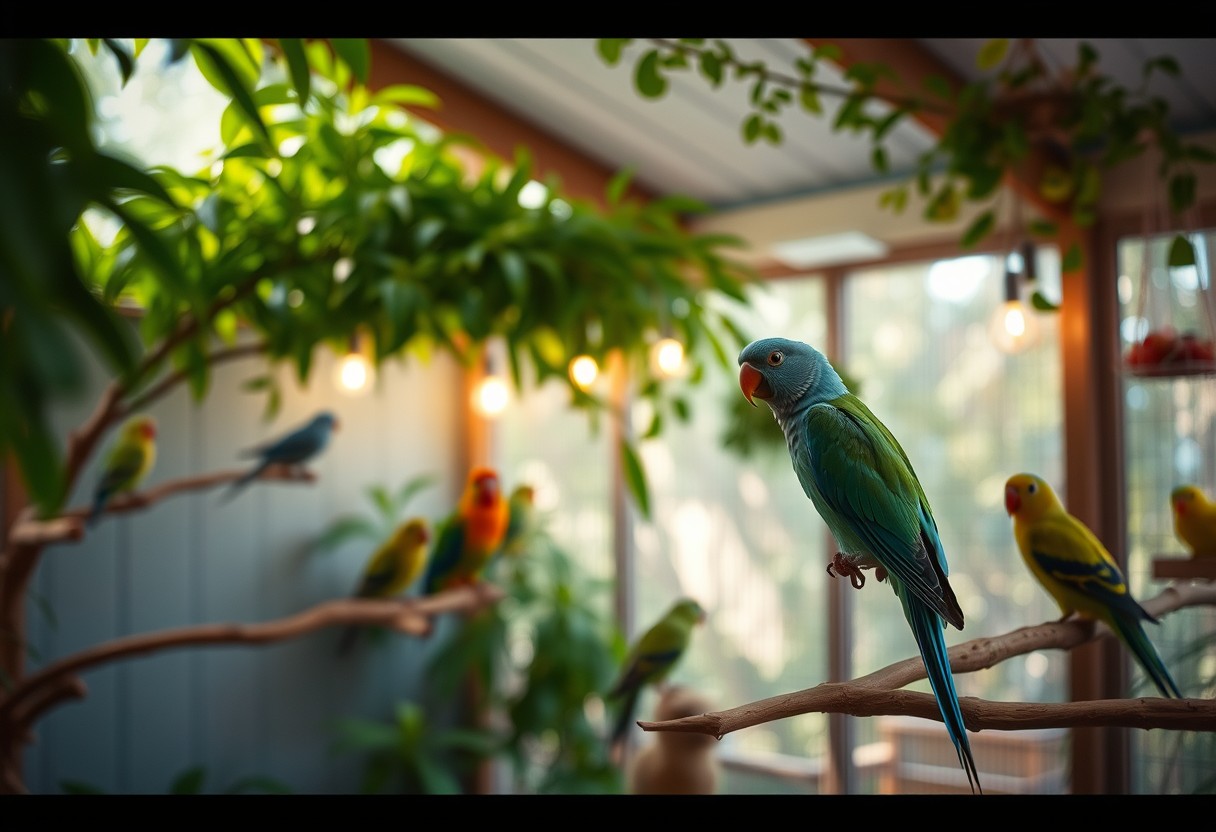
The Role of Caregivers
Despite the many challenges birds face in captivity, the role of caregivers is imperative in cultivating a calm environment that enhances their well-being. Your interactions and the atmosphere you create can profoundly influence how birds respond to their surroundings. Understanding their needs and behaviors is crucial in ensuring a peaceful living environment, paving the way for healthier, happier birds.
Observing Bird Behavior
To build a deeper connection with your feathered friends, it’s vital to take time to observe their behavior. Each bird species exhibits unique traits and tendencies that can reveal a lot about their emotional state. By paying attention to how your birds react to different situations—be it noise, light, or activity level—you can make informed decisions about their care and the environment they inhabit.
To foster a calm atmosphere, it’s imperative to recognize signs of distress or agitation in your birds. Notice their body language: fluffed feathers, pacing, or excessive vocalization can indicate a feeling of unease. Your ability to accurately interpret these behaviors allows you to adjust their environment accordingly, promoting a sense of safety and relaxation.
Fostering Trust and Comfort
With patience and consistency, you can foster trust and comfort in your birds. Building a bond with your feathered companions is paramount to their emotional security and overall well-being. This trust, cultivated through gentle interactions and understanding, enhances their ability to thrive in a calm environment.
Role of trust in bird care cannot be overstated; when birds feel safe with you, they are more likely to exhibit calm behaviors and less likely to show signs of stress. Creating predictable routines and using gentle voices while interacting builds this trust. Your goal should be to ensure that your birds view you as a source of comfort rather than a source of potential stress.
Implementing Calm Practices
Role of implementing calm practices in your caregiving cannot be ignored, as these practices directly impact your birds’ emotional state. Strategies such as providing safe and cozy spaces in their enclosure, minimizing loud noises, and establishing a routine are vital. By creating a serene setting and sticking to a predictable schedule, you significantly reduce the anxiety levels in your birds.
Fostering an atmosphere that prioritizes tranquility can make a considerable difference in your birds’ lives. Techniques like covering their cage at night to simulate a natural environment or providing soft music can create a comforting backdrop, allowing your birds to feel secure and relaxed. It’s imperative to tailor these practices to suit the individual needs of your birds, creating a unique habitat that maximizes their well-being.
Conclusion
Considering all points, it becomes clear that providing a calm environment for your birds is important for their overall well-being and development. A tranquil atmosphere not only reduces stress but also fosters healthier interactions between your feathered friends and their surroundings. By minimizing sudden loud noises, chaotic movements, and potential environmental stressors, you create a sanctuary where your birds can thrive, enjoy their natural behaviors, and engage in social activities that are vital for their happiness.
Additionally, a peaceful setting contributes to your birds’ physical health, potentially decreasing the risk of illnesses exacerbated by stress. When you invest time in establishing a serene environment, you are facilitating not just a better quality of life for your birds, but also enhancing your own experience as a bird owner. The bond you share with your pets flourishes when they feel secure and content, ultimately leading to a fulfilling relationship and a cohesive household where both you and your birds can flourish.
FAQ
Q: What are the primary benefits of a calm environment for birds?
A: A calm environment is crucial for the well-being of birds as it reduces stress levels, which can have a significant impact on their health. A serene atmosphere helps maintain normal behavioral patterns, encouraging natural activities such as foraging, singing, and mating. Additionally, less stressful surroundings can improve a bird’s immune system, making them less susceptible to illness and enhancing their overall quality of life.
Q: How does noise pollution affect birds in a habitat?
A: Noise pollution can have detrimental effects on birds, interfering with their communication, mating rituals, and even predator avoidance strategies. High noise levels can mask important sounds that birds use for warning calls or locating mates, causing confusion and stress. Birds living in high-noise areas may also experience increased heart rates and anxiety, which can lead to unhealthy behaviors and can negatively impact their reproductive success. Providing a calm environment can help mitigate these issues.
Q: What steps can be taken to create a calm environment for pet birds at home?
A: To create a calm environment for pet birds, owners can start by minimizing disruptive factors such as loud noises from televisions, music, or household activities. Setting up a dedicated space for the bird that is away from high-traffic areas can provide them with a sense of security. Incorporating natural elements like plants and natural lighting can also enhance their environment. Regular interaction, gentle handling, and providing enriching toys can further reduce anxiety and create a peaceful atmosphere conducive to the bird’s mental and emotional health.

